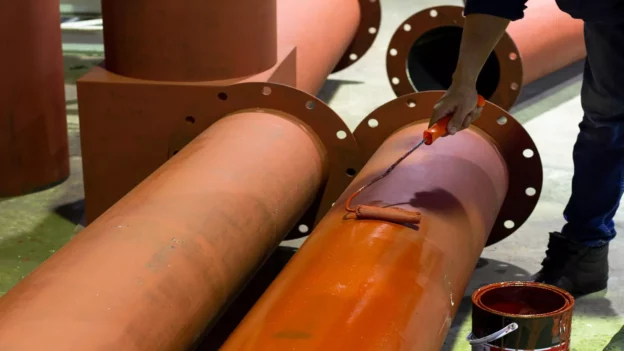Glen Grundberg, the general manager of Denso North America Inc. in Canada, part of Winn & Coales International Ltd, describes the comprehensive training and certification procedure for liquid epoxy coatings in Canada.
In the late 1990s, demand from the Canadian pipe market drove the need for a new and improved, high-build, fast-curing epoxy to work alongside factory-applied Fusion Bond Epoxy (FBE) coatings.
Protal 7200TM: ideal for all seasons
The liquid epoxy had to be applicable in both summer and winter conditions, with significant preheating of the steel. Denso North America responded to this demand by developing Protal 7200TM , an upgrade to its Protal 7000TM liquid epoxy coating, to meet such requirements.
Protal 7200TM is a two-component, VOC-free, 100% solids liquid epoxy coating specially designed to complement FBE coated pipe. It offers a thickness of up to 70 mils (1778 microns) in a single coat, applicable in both the field and the shop and cures quickly, allowing for quick handling and filling times. Additionally, it can operate at temperatures up to 95°C (203°F) , making it the preferred choice for many customers.
Protal 7200TM application process
Protal 7200TM is applied by brush, roller or spray methods. To ensure proper application, Denso North America has established a training specification, prioritizing on-site training, as many applicators lacked prior experience with liquid epoxies and most work was performed on site.
Proper application of Protal 7200TM requires proper substrate surface preparation, including cleaning and abrasive blasting to obtain an angular profile of 2.5 to 5.0 mils, followed by a nearly white finish. The substrate temperature must be between 50°F (10°C) and 212°F (100°C), requiring it to be at least 5°F (3°C) above the dew point before proceeding with the covering. This application specification is reviewed and training is based on it.
Spray training and testing
The spray version of Protal 7200 requires additional training and an approval program that includes theoretical and practical training, followed by cathodic release and hot dip adhesion testing to ensure suitability and performance.
Coatings development continues to advance to meet the growing demands of the industry. New formulations incorporating antimicrobial properties are being explored for applications in healthcare and food environments, as well as self-cleaning coatings that reduce soil buildup and facilitate cleaning in industrial environments . These innovations represent a step forward in the protection and maintenance of key infrastructure.
Follow us on social networks and don’t miss any of our publications!
Inspenet.com YouTube LinkedIn Facebook Instagram X
Source: worldpipelines
Photo: Shutterstock

